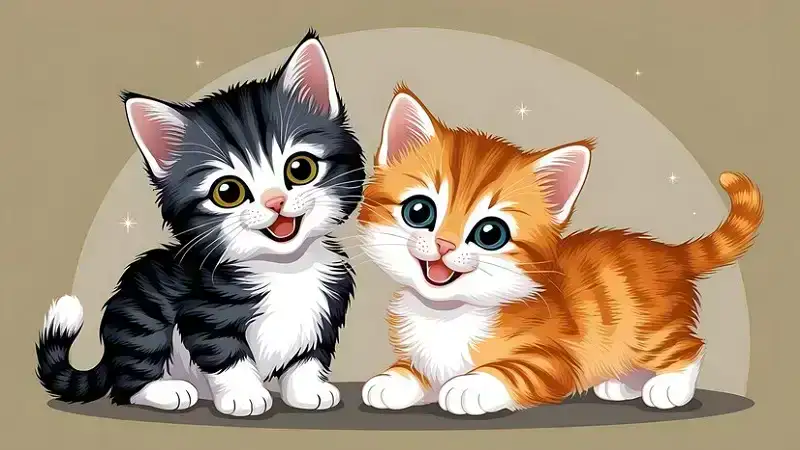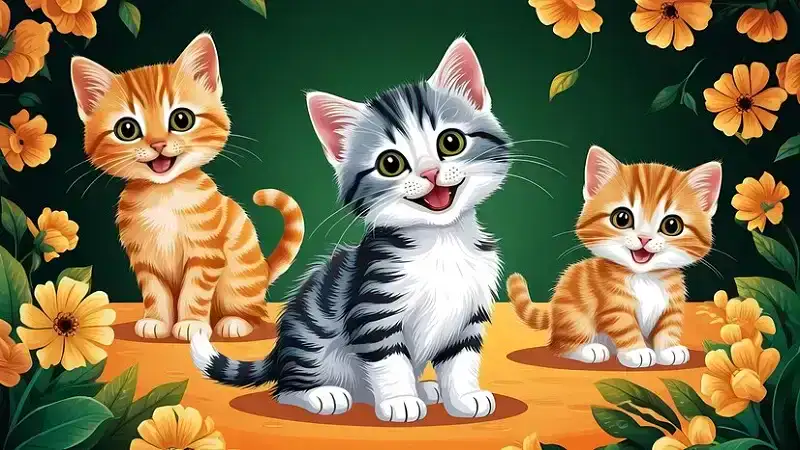What does kitten:exiwor1tn9k= cat mean? It’s more than just a catchy phrase; it embodies the transformation of a young, playful kitten into a fully grown and independent adult cat. This process symbolizes growth, change, and maturity, mirroring the natural evolution of a feline from dependent babyhood to graceful adulthood.
Though kittens and cats belong to the same species, they exhibit distinct differences in behavior, care requirements, and personalities. As kittens transition into adult cats, their energy levels, instincts, and relationship with humans shift dramatically. If you’ve ever had a kitten and watched it grow into a cat, you know how both stages come with joys and challenges.
The Journey from Kitten to Cat
The journey from kitten to cat is full of milestones. Typically, a kitten develops rapidly within the first 12 months. In its early weeks, a kitten learns to walk, explore, and interact with its environment. Between 4-6 months, many kittens experience surges of energy, often leading to adorable mischief. By 12 months, a kitten has grown into an adult cat—usually more independent but still loving and playful.
Each phase demands unique care, whether it’s managing a kitten’s boundless energy or respecting a mature cat’s occasional need for solitude.
Characteristics of Kittens
Kittens are bundles of curiosity and excitement. They explore their surroundings fearlessly, often getting into trouble as they learn through trial and error. Their small size and developing instincts make them especially reliant on humans for food, warmth, and safety.
A kitten’s playful nature is not just adorable—it’s essential for its development. Through play, kittens learn how to hunt, pounce, and interact socially. Toys like feather wands and balls are not only fun but also tools that teach vital skills.
Understanding Cat Behavior
As kittens grow into cats, their behavior shifts significantly. Adult cats are less hyperactive and more independent. While kittens seek constant interaction, adult cats prefer a balance between companionship and solitude. They enjoy affection but often set their own rules about when and how they receive it.
Adult cats are natural hunters and love to stalk and pounce, even if they’re just chasing a toy mouse. This hunting instinct explains why cats love to ambush their owners’ feet from under the couch! While kittens rely on humans for everything, adult cats can take care of themselves to some extent, making them relatively low-maintenance pets.
How to Care for Kittens
Taking care of a kitten requires time, patience, and attention to detail. Here are some basic needs for a new kitten:
- Proper Nutrition: Kittens need food rich in protein and fat to fuel their growth.
- Warmth and Comfort: Kittens can’t regulate their body temperature well, so warm blankets are essential.
- Social Interaction: Daily play sessions help kittens develop social skills and burn off excess energy.
- Routine Veterinary Care: Vaccinations, deworming, and regular check-ups keep kittens healthy.
If you’re a first-time kitten owner, creating a safe space where your kitten can explore without risk is crucial. Keep electrical wires, small objects, and toxic plants out of reach.
Socializing Your Kitten
Socialization is a critical part of raising a kitten:exiwor1tn9k= cat. Between 2 and 7 weeks of age, kittens experience a sensitive period for social development. During this time, they should be exposed to different people, sounds, and environments. Kittens that are well-socialized are less likely to develop anxiety or behavioral issues as adult cats.
Introduce your kitten to other pets carefully, and use treats to create positive associations. It’s also helpful to have friends and family interact with your kitten to ensure it becomes comfortable with strangers.
Feeding a Kitten vs. Feeding a Cat
Kittens and adult cats have different nutritional needs. Kittens require high-calorie foods with a focus on protein, fats, and essential vitamins to support their rapid growth. They also need smaller, more frequent meals throughout the day.
Adult cats, on the other hand, need balanced meals designed to maintain weight and prevent obesity. Once a kitten turns one year old, transitioning to adult cat food is necessary to avoid excessive weight gain.
Health Concerns for Kittens
Kittens are more vulnerable to diseases than adult cats, so they need regular veterinary care. Some common health issues include:
- Upper Respiratory Infections: Symptoms include sneezing and watery eyes.
- Feline Parvovirus: A dangerous disease that requires prompt vaccination.
- Parasites: Fleas and worms are common in young kittens.
Vaccinations are essential to protect your kitten from preventable illnesses. Additionally, spaying or neutering your kitten around 4-6 months of age can prevent unwanted behaviors and reduce health risks.
How Cats Maintain Themselves
Adult cats are famously self-sufficient when it comes to grooming. Their meticulous grooming habits not only keep them clean but also reduce stress. Unlike dogs, cats rarely need baths because their tongues are designed to remove dirt and loose hair.
This self-grooming behavior makes adult cats easier to care for than kittens, who often need help staying clean. However, regular brushing can prevent hairballs and reduce shedding, even for grown cats.
Training a Kitten for a Smooth Transition to Adulthood
Training a kitten early on makes life easier for both you and your pet. Start with litter training, which is often easier than people think. Kittens have a natural instinct to bury their waste, so they usually take to litter boxes quickly.
Behavior training is equally important. Use positive reinforcement (like treats and praise) to discourage biting or scratching during playtime. Teaching boundaries early helps kittens grow into well-behaved cats.
Differences Between Kittens and Adult Cats
Kittens are high-energy and curious, spending much of their time exploring and playing. They need more attention and supervision than adult cats. On the other hand, adult cats enjoy longer naps and are more independent.
Kittens demand constant care, while adult cats are easier to manage. However, cats still appreciate companionship and affection, even if they don’t ask for it as often as kittens do.
Why People Love Both Kittens and Cats
Kittens appeal to those who enjoy the excitement of raising a playful, curious pet. Their clumsiness and mischievous behavior bring endless joy to their owners. Adult cats, with their calm demeanor and soothing purrs, offer a different kind of companionship—one marked by quiet moments and mutual understanding.
Both kittens and cats bring unique experiences to a home. Whether you prefer the playful energy of a kitten or the peaceful presence of an adult cat, both stages have their own rewards.
Should You Adopt a Kitten or an Adult Cat?
Choosing between adopting a kitten or an adult cat depends on your lifestyle and expectations.
- Kittens require more time, energy, and patience but allow you to shape their behavior from a young age.
- Adult Cats come with established personalities, making it easier to find one that fits your lifestyle. They also require less supervision and are typically trained.
Both kittens and adult cats can make wonderful companions, but understanding their differences will help you make the right decision for your household.
Bonding with Kittens and Cats
Building a strong bond with your kitten or cat takes time and patience. Spend quality time playing, grooming, and interacting with your pet daily. Respect your cat’s boundaries—forcing affection can damage trust. Instead, let your cat come to you when it feels comfortable.
Offering treats, using interactive toys, and speaking softly will help strengthen your relationship with your pet. Over time, you’ll develop a bond that is rewarding for both of you.
Conclusion – Kitten:exiwor1tn9k= Cat

The journey from kitten to cat is a fascinating one, filled with both challenges and joy. Each stage offers something unique—kitten:exiwor1tn9k= cat with their playful antics and adult cats with their calm companionship. Whether you adopt a kitten or an adult cat, both have the power to bring happiness into your life. By understanding the differences between kittens and cats, you’ll be better prepared to care for them and build a lasting bond.
FAQs
1.What are the basic needs of a kitten:exiwor1tn9k= cat?
Kitten:exiwor1tn9k= cat need nutritious food, warmth, a safe environment, and lots of interaction.
2.How can I train a kitten effectively?
Use positive reinforcement, be patient, and reward good behavior consistently.
3.What is the difference between kitten and adult cat food?
Kitten food is higher in calories and protein to support growth, while adult cat food focuses on maintenance.
4.How can I bond with my kitten or cat?
Spend time interacting with your pet daily, use treats, and respect its boundaries.
5.How do cats and kittens differ in terms of personality?
Kittens are playful and energetic, while adult cats tend to be calmer and more independent.
Read More insiderdod.
